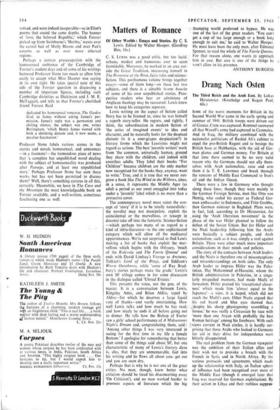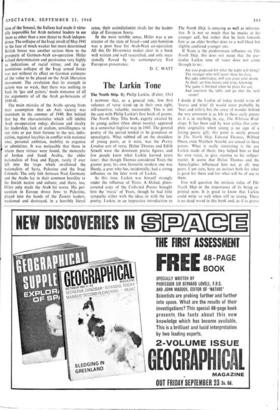Drang Nach Osten
The Third Reich and the Arab East. By Lukas Hirszowicz. (Routledge and Kegan Paul, 60s.) SOME of the worst moments for Britain in the Second World War came in the early spring and summer of 1941. British troops were driven out of Greece. Crete was captured. Rommel recovered all that Wavell's army had captured in Cyrenaica. And in Iraq, the military combined with the nationalist politicians of Rashid Ali's cabinet to expel the pro-British Regent and to besiege the British base at Habbaniya, with the aid of Ger- man planes and German money. For Britain at that time there seemed to be no very valid reason why the Germans should not ally them- selves with Arab nationalists, raise and arm them a la T. E. Lawrence and break through the remains of Middle East Command to Iran's oil and the Indian Ocean.
There were a few in Germany who thought along these lines; though they were mainly in the German Foreign Service, men like Otto von Hentig, who ended his career as Federal Ger- man ambassador to Indonesia, and Fritz Grobba, then German minister in Baghdad. Plans were, in fact, laid, according to Dr Hirszowicz, for using the 'Arab liberation movement' in the phase of the• war Hitler planned to follow the defeat of the Soviet Union. But for Hitler and the Nazi leadership following him the Arabs were basically a subject people, and Arab nationalism, such as it was, simply a tool against Britain. There were other much more important considerations in their minds and policies.
The story of the contacts between Arab leaders and the Nazis is therefore one of misconceptions and misunderstandings on both sides. The only Arab leader to impress Hitler was the Pales- tinian, Haj Mohammed el-Husseini, whom the British administration in Palestine, in a singu- larly misguided moment, had made Mufti of Jerusalem. Hitler praised his 'exceptional clever- ness' which made him 'almost equal to the Japanese'—a view, it is hoped, which did not reach the Mufti's ears. Other Nazis argued that Iris red beard and blue eyes showed that, -Vespite his sharp physiognomy resembling a mouse,' he was really a Circassian by race with 'more than one Aryan with probably the best Roman heritage' among his forebears. With such ,);views current in Nazi circles, it is hardly sur- prising that those Arabs who looked to Germany for aid in their drive for independence were bitterly disappointed.
The real problem from the German viewpoint was the ambition of their Italian allies and their wish not to provoke a breach with the French in Syria and in North Africa. By the various protocols and agreements which made up the relationship with Italy, an Italian sphere of influence had been recognised over most of the Middle East (though it emerged later that Iraq was reserved for German exploitation). By their action in Libya and their ruthless suppres- sion of the Senussi, the Italians had made it virtu- ally impossible for Arab national leaders to see them as other than a new threat to Arab indepen- dence. The collapse of the Iraqi revolt of May 1941 in the face of much weaker but more determined British forces was another serious blow to the prospects of German-Arab co-operation. Hitler valued determination and persistence very highly as indications of racial virtue; and the ig- nominious collapse of the Iraqi armed forces was not without its effect on German estimates of the value to be placed on the Arab liberation movement. The revelation that its strength in action was so weak, that there was nothing to back its 'gas and gaiters,' made nonsense of all the arguments of all the Arab go-betweens of 1940-41.
The main mistake of the Arabs sprang from their assumption that an Axis victory was imminent in the summer of 1940. But behind that lay the characteristics which still inhibit Arab co-operation today; division and rivalry for leadership, lack of realism, unwillingness to run risks or put their fortune to the test, indis- cipline, regional loyalties in conflict with national ones, personal ambition, inability to organise or administer. It was noticeable that those in whom these virtues were found, the monarchs of Jordan and Saudi Arabia, the older nationalists of Iraq and Egypt, rarely if ever fell into the traps which swallowed the nationalists of Syria, Palestine and the Iraqi Colonels. The only link between Nazi Germany and the Arabs lay in their common hostility to the Jewish nation and culture; and there, too, Hitler only made the Arab lot worse. His per- secution in Europe drove Jews to Palestine, played into the hands of the Zionist leaders, weakened and destroyed, in a horribly literal sense, their assimilationist rivals for the leader- ship of European Jewry.
In the most terrible sense, Hitler was a co- creator of the state of Israel—and anti-Semitism was a poor base for Arab-Nazi co-operation. All this Dr Hirszowicz makes clear in a book well written and well researched, and only occa- sionally flawed by its contemporary East European provenance.
D. C. WATT



































 Previous page
Previous page